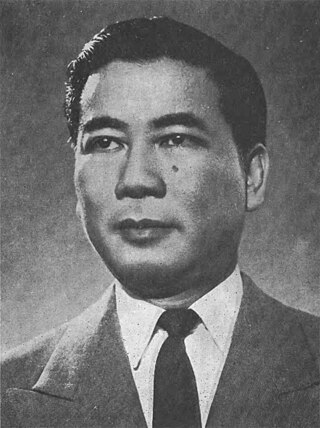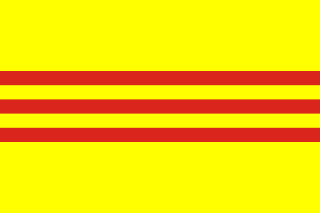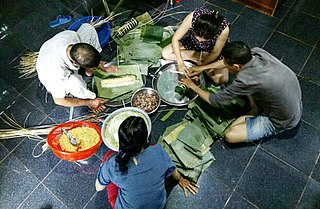
Agent Orange is a chemical herbicide and defoliant, one of the tactical use Rainbow Herbicides.

The People's Army of Vietnam (PAVN), officially the Vietnam People's Army, also recognized as the Vietnamese Army or the People's Army, is the national military force of the Socialist Republic of Vietnam and the armed wing of the ruling Communist Party of Vietnam (CPV). The PAVN is a part of the Vietnam People's Armed Forces and includes: Ground Force, Navy, Air Force, Border Guard and Coast Guard. Vietnam does not have a separate Ground Force or Army service. All ground troops, army corps, military districts and special forces belong to the Ministry of National Defence, directly under the command of the CPV Central Military Commission, the Minister of National Defence, and the General Staff of the Vietnam People's Army. The military flag of the PAVN is the National flag of the Socialist Republic of Vietnam defaced with the motto Quyết thắng added in yellow at the top left.

The Vietnam War was a conflict in Vietnam, Laos, and Cambodia from 1 November 1955 to the fall of Saigon on 30 April 1975. It was the second of the Indochina Wars and was a major conflict of the Cold War. While the war was officially fought between North Vietnam and South Vietnam, the north was supported by the Soviet Union, China, and other communist states, while the south was supported by the United States and other anti-communist allies, making the war a proxy war between the United States and the Soviet Union. It lasted almost 20 years, with direct U.S. military involvement ending in 1973. The conflict also spilled over into neighboring states, exacerbating the Laotian Civil War and the Cambodian Civil War, which ended with all three countries officially becoming communist states by 1976.

French Indochina, officially known as the Indochinese Union and after 1947 as the Indochinese Federation, was a grouping of French colonial territories in Mainland Southeast Asia until its demise in 1954. It comprised Cambodia, Laos, the Chinese territory of Guangzhouwan, and the Vietnamese regions of Tonkin in the north, Annam in the centre, and Cochinchina in the south. The capital for most of its history (1902–1945) was Hanoi; Saigon was the capital from 1887 to 1902 and again from 1945 to 1954.

Ngô Đình Diệm was a South Vietnamese politician who was the final prime minister of the State of Vietnam (1954–1955) and later the first president of South Vietnam from 1955 until his capture and assassination during the CIA-backed 1963 South Vietnamese coup.

Hanoi is the capital and second-most populous city of Vietnam. As evident by the literal translation of its name – 'inside the river' – portions of Hanoi's border are delineated by the Red River and the Black River. As a municipality, Hanoi consists of 12 urban districts, 17 rural districts, and 1 district-level town. It has an area of 3,359.82 km2 (1,297.23 sq mi) and a population of 8,435,700 in 2022. In 2020, Hanoi has the second-highest gross regional domestic product of all Vietnam provinces and municipalities at 51.4 billion USD, behind Ho Chi Minh City. Hanoi Capital is also ASEAN 8th largest economy after Surabaya.

South Vietnam, officially the Republic of Vietnam was a country in Southeast Asia that existed from 1955 to 1975, the period when the southern portion of Vietnam was a member of the Western Bloc during part of the Cold War after the 1954 division of Vietnam. It first received international recognition in 1949 as the State of Vietnam within the French Union, with its capital at Saigon, before becoming a republic in 1955. South Vietnam was bordered by North Vietnam to the north, Laos to the northwest, Cambodia to the southwest, and Thailand across the Gulf of Thailand to the southwest. Its sovereignty was recognized by the United States and 87 other nations, though it failed to gain admission into the United Nations as a result of a Soviet veto in 1957. It was succeeded by the Republic of South Vietnam in 1975. In 1976, the Republic of South Vietnam and North Vietnam merged to form the Socialist Republic of Vietnam.

Ho Chi Minh City, commonly known as Saigon, is the most populous city in Vietnam, with a population of around 9.3 million in 2023. The city's geography is defined by rivers and canals, the largest of which is the eponymously-named Saigon River. As a municipality, Ho Chi Minh City consists of 16 urban districts, six rural districts, and one municipal city. As the largest financial centre in Vietnam, Ho Chi Minh City has the highest gross regional domestic product out of all Vietnam provinces and municipalities, contributing around a quarter of the country's total GDP. Ho Chi Minh City metropolitan is ASEAN 6th largest economy, also the biggest outside ASEAN country capital.

Hồ Chí Minh, colloquially known as Uncle Ho or just Uncle (Bác), and by other aliases and sobriquets, was a Vietnamese communist revolutionary, nationalist, and politician. He served as prime minister of the Democratic Republic of Vietnam from 1945 to 1955 and as president from 1945 until his death, in 1969. Ideologically a Marxist–Leninist, he was the Chairman and First Secretary of the Workers' Party of Vietnam, the predecessor of the current Communist Party of Vietnam.

The Viet Cong was an epithet to call the communist movement and united front organization in South Vietnam, Laos and Cambodia. Formally organized as and led by the National Liberation Front of South Vietnam, it fought under the direction of North Vietnam against the South Vietnamese and United States governments during the Vietnam War. The organization had both guerrilla and regular army units, as well as a network of cadres who organized and mobilized peasants in the territory the Viet Cong controlled. During the war, communist fighters and some anti-war activists claimed that the Viet Cong was an insurgency indigenous to the South, while the U.S. and South Vietnamese governments portrayed the group as a tool of North Vietnam. It was later conceded by the modern Vietnamese communist leadership that the movement was actually under the North Vietnamese political and military leadership, aiming to unify Vietnam under a single banner.

Tết, short for Tết Nguyên Đán, is the most important celebration in Vietnamese culture. Tết celebrates the arrival of spring based on the Vietnamese calendar and usually has the date in January or February in the Gregorian calendar.

Vietnam, officially the Socialist Republic of Vietnam (SRV), is a country at the eastern edge of mainland Southeast Asia, with an area of about 331,000 square kilometres (128,000 sq mi) and a population of over 100 million, making it the world's fifteenth-most populous country. Vietnam shares land borders with China to the north, and Laos and Cambodia to the west. It shares maritime borders with Thailand through the Gulf of Thailand, and the Philippines, Indonesia, and Malaysia through the South China Sea. Its capital is Hanoi and its largest city is Ho Chi Minh City.

The First Indochina War was fought between France and Việt Minh, and their respective allies, from 19 December 1946 until 20 July 1954. Việt Minh was led by Võ Nguyên Giáp and Hồ Chí Minh. Most of the fighting took place in Tonkin in Northern Vietnam, although the conflict engulfed the entire country and also extended into the neighboring French Indochina protectorates of Laos and Cambodia.

The Sino-Vietnamese War was a brief conflict that occurred in early 1979 between China and Vietnam. China launched an offensive in response to Vietnam's invasion and occupation of Cambodia in 1978, which ended the rule of the Chinese-backed Khmer Rouge. The conflict lasted for about a month, with China withdrawing its troops in March 1979.

The Vietnamese people or the Kinh people, also recognized as the Viet people or the Viets, are a Southeast Asian ethnic group native to modern-day Northern Vietnam and Southern China who speak Vietnamese, the most widely spoken Austroasiatic language.

The fall of Saigon, was the capture of Saigon, the capital of South Vietnam, by North Vietnam on 30 April 1975. The event marked the end of the Vietnam War and the collapse of the South Vietnamese state, leading to a transition period and the formal reunification of Vietnam into the Socialist Republic of Vietnam under communist rule on July 2 1976.

The Vietnam national football team represents Vietnam in men's international senior football and is controlled by the Vietnam Football Federation, the governing body of football in Vietnam. It has been nicknamed the Golden Star Warriors.

The Voice of Vietnam is the Vietnamese national radio broadcaster. Directly controlled by the government of Vietnam, it is tasked propagating the policies of the Party and the laws of the state.

North Vietnam, officially the Democratic Republic of Vietnam, was a socialist state in Southeast Asia that existed from 1945 to 1976, with formal sovereignty being fully recognized in 1954. A member of the Eastern Bloc, it opposed the French-backed State of Vietnam and later the Western-allied Republic of Vietnam. North Vietnam emerged victorious over South Vietnam in 1975 and ceased to exist the following year when it unified with the south to become the current Socialist Republic of Vietnam.

Diplogastridae, formerly Diplogasteridae, are a family of nematodes (roundworms) known from a wide range of habitats, often in commensal or parasitic associations with insects.


















